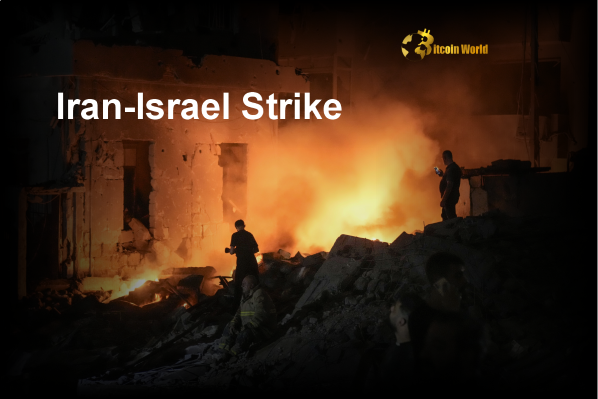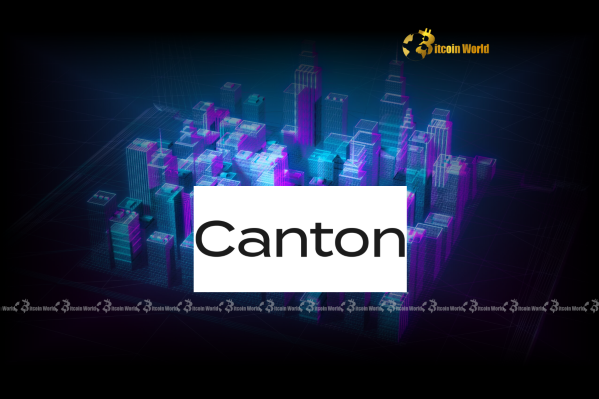BitcoinWorld

Iran Israel Strike: Urgent Update on Escalating Middle East Tensions
Breaking news from the Middle East indicates a significant development: the Israeli Air Force has reportedly conducted a strike within Iran. This action, reported by Axios and shared widely via platforms like X by figures such as Walter Bloomberg, marks a critical moment in the ongoing regional tensions. For those following global events and their potential ripple effects on financial markets, including the often-sensitive cryptocurrency space, understanding the nuances of this situation is paramount. This event injects a new level of Geopolitical Risk into an already volatile global landscape.
Understanding the Latest Iran Israel Strike
The report of an Iran Israel Strike follows a period of heightened direct confrontation between the two nations. For years, the conflict has primarily unfolded through proxies and covert operations. However, recent events saw Iran launch an unprecedented direct missile and drone attack on Israel, which Iran stated was in retaliation for a strike on its consulate in Damascus. Israel had vowed to respond to Iran’s direct attack. The reported strike in Iran appears to be that response, bringing the long-simmering conflict into a more overt phase.
While details are still emerging, initial reports suggest the strike targeted specific locations within Iran. The nature and extent of the damage, as well as Iran’s official response, are key factors that will determine the immediate trajectory of the situation. The world watches closely, assessing the potential for further escalation.
Why Geopolitical Risk Matters for Global Markets
Major geopolitical events inherently introduce uncertainty, which financial markets dislike. An increase in Geopolitical Risk can trigger significant reactions across various asset classes. Historically, conflicts in the Middle East, a region central to global energy supplies, have had pronounced effects on oil prices. Rising oil prices can contribute to inflation, impacting monetary policy decisions by central banks worldwide. This, in turn, influences everything from bond yields to stock valuations.
Beyond energy, heightened tensions can disrupt supply chains, affect international trade, and dampen investor confidence. In times of uncertainty, investors often move towards assets traditionally considered ‘safe havens,’ such as gold or certain government bonds. However, the definition of a safe haven can shift, and the interconnectedness of modern markets means that even traditional safe havens can experience volatility during extreme stress events.
Here are some potential ways geopolitical risk can ripple through markets:
- Energy Prices: Direct impact if conflict threatens production or transit routes.
- Investor Sentiment: Increased fear can lead to sell-offs in riskier assets.
- Supply Chains: Disruptions can affect global manufacturing and trade.
- Inflation: Higher energy or commodity prices can fuel inflationary pressures.
- Central Bank Policy: Geopolitical factors can influence decisions on interest rates.
Navigating Escalating Middle East Tensions
The current Middle East Tensions between Iran and Israel are particularly concerning due to the potential for a wider regional conflict involving other state and non-state actors. The involvement of proxies, the strategic importance of the region, and the complex web of alliances make de-escalation challenging. Any miscalculation could have severe consequences, extending beyond the immediate combatants.
Understanding the historical context is crucial. The animosity between Iran and Israel dates back decades, rooted in political, religious, and strategic disagreements. Iran’s support for groups hostile to Israel and its nuclear program are central points of contention. Israel views Iran as an existential threat. This latest direct exchange marks a dangerous evolution in their rivalry.
International reactions play a key role in shaping the narrative and potential outcomes. Calls for restraint from global powers are common, but the effectiveness of such calls depends on the willingness of the parties involved to step back. The position of major global players like the United States, European Union nations, Russia, and China will be critical in diplomatic efforts, or lack thereof.
The Potential Global Market Impact
The immediate Global Market Impact of the reported strike is likely to manifest as increased volatility. Futures markets often react quickly to such news, and the start of trading sessions will reveal how this development is being priced in by investors worldwide. Sectors most directly affected might include energy, defense, and potentially technology, given the reliance on global supply chains.
However, the longer-term impact depends heavily on whether this event leads to further escalation or if diplomatic efforts manage to contain the situation. A prolonged or expanded conflict would likely have a more sustained negative impact on global economic growth prospects and market stability. Conversely, a swift de-escalation could see markets recover relatively quickly, having priced in the initial shock.
Market participants will be closely monitoring official statements from Iran and Israel, as well as reactions from major international bodies and governments. The language used and the actions taken in the coming hours and days will be critical indicators of the potential trajectory of the conflict and, consequently, the markets.
Considering Crypto Volatility in Times of Geopolitical Stress
The relationship between geopolitical events and the cryptocurrency market is complex and not always straightforward. While Bitcoin was envisioned by some as a non-sovereign store of value, potentially acting as a safe haven during traditional financial system stress, its price often behaves like a risk asset, correlating with technology stocks.
Crypto Volatility is already a defining characteristic of the market. Geopolitical events can exacerbate this volatility, though the direction isn’t always predictable. In some instances, initial news of conflict might lead to a sell-off in risk assets, including crypto. However, if the event is perceived as weakening traditional financial systems or increasing inflation fears (due to rising commodity prices, for example), some investors might theoretically turn to Bitcoin or other cryptocurrencies as an alternative store of value, potentially driving prices up.
The crypto market is also influenced by global liquidity and macroeconomic factors, which are indirectly affected by geopolitical stability. Increased global uncertainty can lead to tighter financial conditions, which typically pressure risk assets like cryptocurrencies. Conversely, if central banks were to react to a geopolitical crisis with more accommodative monetary policy (though this is not the current trend), it could potentially provide tailwinds for crypto.
Here’s a look at potential, though not guaranteed, impacts on crypto:
- Initial Sell-off: As part of a broader risk-off move across markets.
- Increased Correlation: May see crypto move in tandem with traditional indices like the S&P 500.
- Narrative Play: Renewed discussion around Bitcoin as a potential safe haven, though market action doesn’t always support this consistently.
- Heightened Volatility: Prices likely to swing more dramatically based on news flow.
For cryptocurrency holders and traders, this period calls for increased vigilance. Monitoring global news alongside market data is essential. Understanding that external, non-crypto specific events can significantly impact digital asset prices is a crucial part of navigating this market.
What Happens Next? Potential Scenarios
Predicting the future in geopolitical situations is impossible, but analysts are considering several potential scenarios following the reported Iran Israel Strike:
- De-escalation: Both sides, having demonstrated capability and resolve, might choose to step back, possibly under international pressure. This is the most hopeful scenario for regional stability and markets.
- Limited, Tit-for-Tat Exchanges: The situation could devolve into a series of limited strikes and counter-strikes, potentially targeting military assets or infrastructure, but avoiding all-out war. This maintains high tension and market uncertainty.
- Wider Regional Conflict: The conflict could expand, drawing in proxies or even direct involvement from other regional powers or global players. This is the most dangerous scenario with severe humanitarian and economic consequences.
The actions and rhetoric of leaders in Tehran, Tel Aviv, Washington D.C., and other capitals will provide clues about which path is most likely being taken. Diplomatic efforts, back-channel communications, and public statements will all be scrutinized.
Actionable Insights for the Informed Reader
Given the unfolding situation and its potential Global Market Impact, what should readers, especially those with exposure to volatile assets like cryptocurrencies, consider?
- Stay Informed: Rely on reputable news sources for updates on the geopolitical situation. Understand the facts as they are reported and differentiate them from speculation.
- Assess Your Risk Tolerance: Geopolitical events are a reminder that external shocks can occur. Ensure your investment portfolio aligns with your comfort level regarding risk and volatility.
- Understand Market Correlations: Be aware that crypto prices can be influenced by broader market sentiment and macroeconomic factors tied to global stability.
- Avoid Panic Decisions: Volatility can trigger emotional responses. Make investment decisions based on your long-term strategy, not short-term news spikes.
- Diversification: Consider whether your portfolio is adequately diversified across different asset classes, which can help mitigate risks associated with specific market segments or events.
While it’s impossible to perfectly predict how Middle East Tensions will specifically affect Crypto Volatility in the short term, being prepared for potential market reactions is prudent. This involves understanding the underlying factors at play and maintaining a rational approach to investing during uncertain times.
Summary: A Critical Juncture
The reported Iran Israel Strike marks a significant escalation in long-standing Middle East Tensions. This event immediately heightens Geopolitical Risk, with potentially far-reaching consequences for regional stability and the global economy. The Global Market Impact is likely to be characterized by increased uncertainty and Crypto Volatility, at least in the short term. While the exact trajectory of events remains uncertain, the coming days will be critical in determining whether this leads to further conflict or a path towards de-escalation. For investors and global citizens alike, staying informed and understanding the potential implications of this developing situation is essential.
To learn more about the latest crypto market trends and how geopolitical events can influence them, explore our articles on key developments shaping cryptocurrency price action and institutional adoption.
This post Iran Israel Strike: Urgent Update on Escalating Middle East Tensions first appeared on BitcoinWorld and is written by Editorial Team





